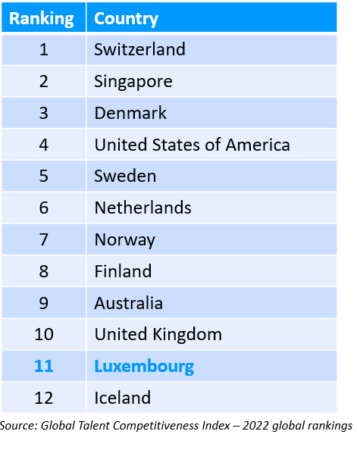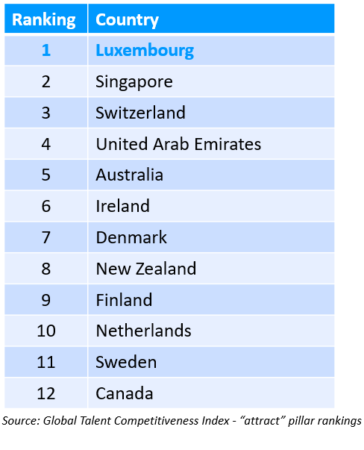It is no secret that prosperous economies tend to attract the most talented individuals from all over the world, and a country’s ability to keep those bright minds in its workforce undoubtedly results in massive economic gains. The Global Talent Competitiveness Index, published annually by business school INSEAD, assesses how different countries grow, attract, enable, and retain talent.
The grand duchy maintained its unrivalled first-place position in attracting talents in the 2022 report. On a global scale, this means that Luxembourg is an interesting go-to location for highly skilled workers and businesses. In fact, the report explicitly states that Luxembourg is a “stellar performer” when it comes to talent attraction.
Luxembourg is well-known for its large expat community of over 170 nationalities, in addition to being an ideal gateway to Europe due to its central location in the heart of Europe. More than 70% of its workforce is made up of foreign nationals and cross-border workers from neighbouring countries, providing a diverse range of backgrounds and skillset to local businesses.
Overall, Luxembourg ranked 11th out of all countries assessed, down from 8th in the previous report, and dropped from fourth to ninth in the 2015-2018 and 2019-2022 time intervals. However, its index score improved during these periods.

World leader in talent attraction
Knowing that Luxembourg is the most attractive country for talents is one thing but understanding why and how it ranks so high for talent attraction makes one appreciate its strategic positioning even more.
The 2022 Global Talent Competitiveness Index is based on four main input pillars (grow, attract, enable, and retain) and two output pillars.
The attract pillar considers variables that assess a country’s external openness to businesses and individuals, as well as internal openness in terms of the social inclusion of various groups such as immigrants, minorities, and women. Luxembourg was the best performer globally with a 91.96% score, earning it the top spot for talent attraction. The country also ranked first in five more specific indicators linked to this pillar including the openness of FDI regulations to foreign investors, integration in global financial flows, the number of international students as a percentage of the total tertiary enrolment, and women’s economic empowerment.

The grow pillar examines metrics related to developing talent, such as formal education, lifelong learning, and opportunities for advancement, whereas the retain pillar examines lifestyle and sustainability metrics that improve one’s quality of life. Luxembourg ranked 21st in the former pillar and 9th in the latter, its second-best performance worldwide.
Enabling talents consists of business, market, labour, and regulatory measures that make talent acquisition and growth easier. It assesses indicators like the government’s effectiveness and perceptions of public service, R&D expenditure, ICT infrastructure, cluster development, and enterprise software, to name a few. Under this pillar, the Grand Duchy ranked 11th in the world.
The two output pillars, Global Knowledge (GK) and Vocational and Technical (VT) skills differentiate between mid-level and high-level skills and their economic impact. Luxembourg ranked 11th and 21st consecutively. Luxembourg’s was ranked no. 1 under the professional’s indicator, which looks at the number of high-level professionals as a share of the total workforce. The country also features in the top 20 worldwide for its innovation output that reflects “the richness of innovation in society”.
Attractive capital city, excellent gender equality
The report examines top ranking cities in addition to the country level analysis. Luxembourg City is ranked 15th overall in this Global Cities Talent Competitiveness Index.
Two of its best performances were in the talent attraction pillar, where the city ranked first, and the enable pillar, where it ranked fifth, ahead of Boston, Hong Kong, and Dublin.
On a global scale, Luxembourg also performed well in terms of gender equality. The country was among the top ten in the world with the least gender-divides, particularly in the aftermath of COVID-related layoffs. This conclusion was reached based on three indicators examined in the report: economic empowerment of women, gender parity in high-skilled jobs, and women’s leadership opportunities.
Luxembourg also performed well in terms of gender equality on a global scale. The country ranked among the top ten in the world. This conclusion was reached based on three indicators examined in the report: economic empowerment of women, gender parity in high-skilled jobs, and opportunities for women to lead.
Strong long-term performance
When comparing the current report to the previous two reports from 2021 and 2020, Luxembourg’s ranking has dropped slightly. For example, on a global scale, it ranks 11th in the current report while ranking 8th in the 2020 and 2021 report. It previously ranked fourth in the 2020 study for talent retention, but now ranks ninth.
Nonetheless, the Grand Duchy maintains its position as a global leader, with new gains observed in some of the examined indicators, such as improvements in regulatory quality (4th compared to 10th in 2021) or new high-level skills (10th compared to 19th in 2020), which attest to the progress made.
Photo credit: Shutterstock


